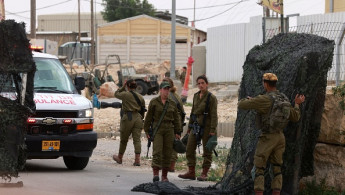Israeli delegation visits Cairo to continue probe into deadly border shooting
An Israeli military delegation arrived in Egypt on Sunday night to continue a joint investigation into a deadly border shooting earlier this month by an Egyptian soldier which killed three Israeli troops.
The commander of Israel’s southern region, Eliezer Toledano, arrived in Cairo accompanied by the head of the Foreign Relations Brigade, Brigadier General Avi Davrin, and the head of the operations unit in the intelligence department, only identified as Colonel "J".
The three met with Egyptian military officials to discuss the ongoing probe into the 3 June shooting by an Egyptian soldier who infiltrated the Israeli border to carry out the attack. He was then shot dead by Israeli forces.
Egypt had initially said he was pursuing drug traffickers before he encountered the Israeli troops, but this has not been confirmed.
He has been celebrated by some Egyptians and Arabs as a hero and martyr.
"The joint investigation began on the day of the incident when a delegation including senior Egyptian army officials visited the site of the incident in Israel," Israeli army Arabic-language spokesman Avichay Adraee wrote on Twitter.
What inspired Mohamed Salah’s actions on Saturday – to cross into Israel and fatally shoot at the Israeli army – was conditioned by a political reality that the Egyptian regime is terrified to acknowledge 👇 https://t.co/hMm3UY4mzq
— The New Arab (@The_NewArab) June 9, 2023
"Both sides have shown their commitment to conducting an in-depth investigation and finding out the truth," he continued.
Though usually quiet, the Israeli-Egyptian frontier has witnessed a number of ambushes and rocket attacks in the past decade, with military personnel and militants in Northern Sinai killed on both sides.
But June’s shooting has worried Israel, shattering decades of calm between the once enemy nations who signed the unpopular Camp David peace treaty in 1979.
Israel claims the attack was a premeditated plan, an act of ‘lone wolf terrorism’ by 22-year-old conscript Mohammed Salah Ibrahim.
Embarrassed by the incident and attempting to minimalise backlash, Cairo concealed the Ibrahim’s identity for days and then banned his family from holding a public funeral.





 Follow the Middle East's top stories in English at The New Arab on Google News
Follow the Middle East's top stories in English at The New Arab on Google News


